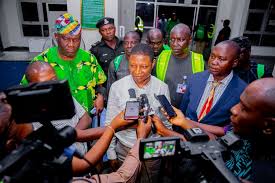The House of Representatives on November 15, 2017, launched investigation into the alleged mismanagement of about N8.6 billion funds meant for payment of allowances to participants in the Students Industrial Work Experience Scheme (SIWES) between 2010 and 2017. JOSHUA EGBODO writes.
Going by the revelations made at the House of Representatives’ investigative hearing into the N8.6 billion funds for Students Industrial Work Experience Scheme (SIWES), it seems the workings of the scheme may have been misunderstood.
The Issue
It was on May 10, 2017 that the House of Representatives passed a resolution, directing its Committee on Industry to investigate the reported mismanagement of funds meant to pay supervisory and participatory allowances for persons on the SIWES by the ITF.
A member, Hon. Kingsley Chinda had in a motion leading to the resolution, on the “Need to address the non-payment of SIWES allowances to students by the Industrial Training Fund (ITF)”, told his colleagues that failure of the ITF to pay allowances to students who participated in the SIWES should naturally attract attention of the House, as representatives of the people.
“It is unpatriotic for the ITF or any government agency to deliberately bring hardship to students by withholding funds that have been released for payment of their SIWES allowances. Unless urgent action is taken to check the prevailing sharp practices in the operations of the ITF, students will continue to be ripped off”, the lawmaker argued while moving the motion, which was unanimously adopted by members through voice votes.
The Hearing
But on November 15, when the House Committee on Industry held an investigative hearing into the allegation, pursuant to the House’s resolution, the ITF reeled out details of how much has so far been paid out to beneficiaries of the scheme within the period under review.
Director General of the ITF, Joseph Ari, who told the Abubakar Moriki-led panel that the Fund had a very transparent and effective accounting system in place, explained that the sum of N13.4 billion has been paid to thousands of students under the SIWES in seven years, a figure that was far higher than the alleged sum said to have been mismanaged, or possibly stolen in part. According to him, the amount represented payments to a total of 1.026 million students, between 2010 and 2017.
He also informed the panel that the ITF within the period experienced shortfall of funds ranging from N1.1 billion to two billion naira.
Breakdown of expenses
Giving comprehensive breakdown of the payments made by the ITF, he said “N1.105 billion was paid to 88,335 students in 2010, N1.123 billion for 81,355 in 2011, N1.176 billion for 101,665 in 2012, and N3.067 billion for 270,035 students in 2013.”
Explaining further, he said N2.191 billion was paid to 171,667 students in 2014, N1.122 billion to 83,365 students in 2015, N1.060 billion to 97,492 in 2016, and N2.555bn to 132,847 students in 2017.
Ari said that the allegations that the scheme was not managing funds well were totally incorrect, explaining that the scheme was specifically designed for students of engineering, technology and technical related courses, but that all sorts of courses now make requests to be added, noting that this was the main reason behind the “misconception” about it.
Increased enrolment
Also responding to issues on which agency should was best suited to manage the SIWES funds, Ari said the ITF, established for over 40 years ago, has all it takes to continue managing the scheme.
According to the DG, the level of students’ enrolment has increased from 784 at inception to 3.5 million in 2017. “Over the years, the scheme has attracted wide acceptance with all universities, polytechnics and colleges of Education clamouring to get their institutions’ courses approved for the scheme.
“Consequently, participation in the scheme has witnessed astronomical and remarkable increase. The scheme, which commenced with 11 higher institutions in 1974, has increased to 311 in 2017. This is made up of 121 universities, 115 polytechnics and monotechnics and 75 colleges of education”, he explained.
Irregularities in academic calendar
On the challenges of amount of money released and that paid, he said same can be attributed to irregularities in institutions’ academic calendar, resulting in many students not able to go on attachment at the right time, adding that other are strike actions in institutions which leads to delay in commencement of students’ participation in the scheme.
The National Universities Commission (NUC), which was invited as a critical stakeholder, and on that date was represented by Mrs. Margaret Oyedele, a Deputy Director in charge of SIWES coordination in the Commission, said NUC is neither involved in the disbursement of funds nor monitoring the exercise.
While even calling for improved funding of the scheme, the NUC representative insisted that the ITF remained the appropriate body, and in the best position to effectively manage the scheme.
Also, a representative of the National Board for Technical Education (NBTE) Mr N. Edeniran, said SIWES is part of polytechnic curricula and that the board has no role whatsoever in funds disbursement by the ITF.
It is though not out of place for any matter to come on the floor for the House to seek details of how public funds are expended, as it is constitutionally empower to do so, report of findings of the committee, and its recommendations will be subjected to the entire House’s adoption in due course.
Chairman of the panel, Abubakar Moriki in his opening remarks during the investigative public hearing that the probe was necessitated by allegations of management of SIWES funds, implying that ITF has not been transparent in the funds management, resulting in students not being paid their allowances as at when due, adding that the programme initiated to bridge the gap between theory and practice.
But With the revelations so far made, many have expressed concerns that the House of Representatives may not have been in tune with the needed details before embarking on the wild goose chase.



